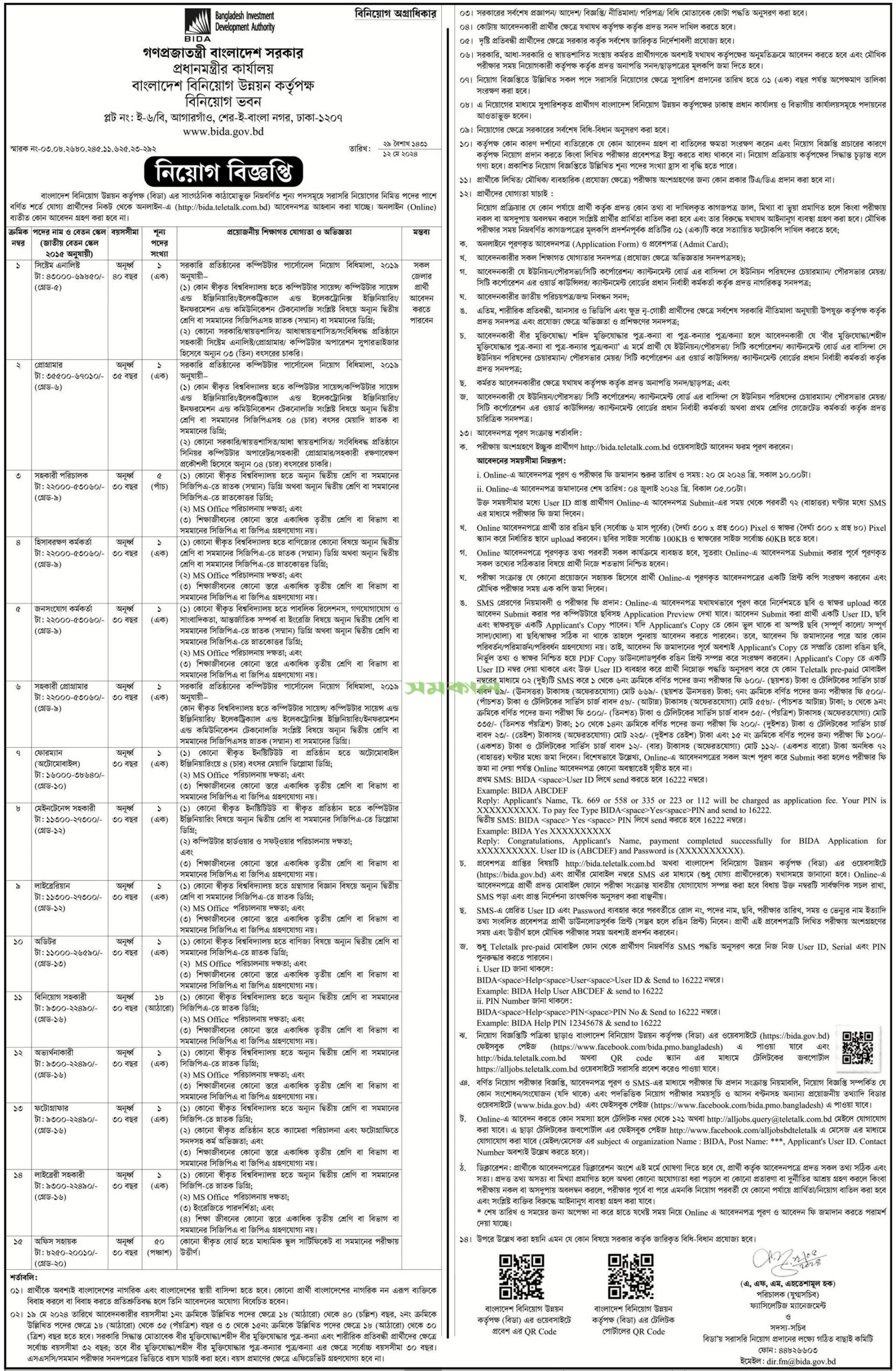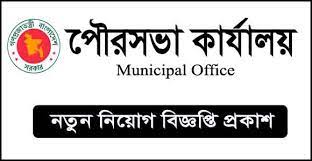Bangladesh Investment Development Authority (BIDA)
বাংলাদেশ বিনিয়োগ উন্নয়ন কর্তৃপক্ষ (বিডা)
Job Category: Govt. Job
Job Source: দৈনিক সমকাল
Posted On: 19 May 2024
Application Deadline:4 Jul 2024
Web: www.bida.gov.bd

Apply
Welcome to our website bangladeshtodays.org. This is the best website online. Here you will get daily updates on all types of job news such as: E.g Job Vacancies in Public Sector, Private Sector, Corporate, Banking, NGO Jobs etc. You can select any type of job from the category option in the top menu of the website. You can apply for jobs directly on our website. There is a search option at the top of this website where you can search for jobs according to your requirements. If you have benefited even in the slightest from our website, then you can tell your friends, family and everyone else about this website. I hope you also benefit from this website. You can share this website post on Facebook, Instagram, Twitter or any other online platform if you want. Many people can benefit from your sharing. And if there is anything you want to know or understand, you can contact us by email on the contact page of this website. We will try our best to help you, thank you very much.
Title: Catalyzing Economic Growth: The Role of the Bangladesh Investment Development Authority (BIDA)
Introduction:
The Bangladesh Investment Development Authority (BIDA) serves as a critical engine driving economic growth and development in Bangladesh. Tasked with attracting and facilitating investment, BIDA plays a pivotal role in creating a favorable business environment, fostering economic diversification, and promoting sustainable development. This comprehensive exploration delves into the history, functions, challenges, and impact of BIDA in transforming Bangladesh into a preferred investment destination and bolstering its economic prospects.
Historical Background:
The establishment of BIDA marked a significant milestone in Bangladesh’s economic development trajectory. BIDA was formed in 2016 by merging the Board of Investment (BOI) and the Privatization Commission to streamline investment promotion and facilitation under one umbrella. This consolidation aimed to eliminate bureaucratic inefficiencies, enhance coordination, and create a more investor-friendly environment. Since its inception, BIDA has been instrumental in shaping policies, implementing reforms, and driving initiatives to attract both domestic and foreign investment.
Functions and Responsibilities:
BIDA performs a multifaceted role in promoting investment, facilitating business operations, and supporting economic growth. Its core functions and responsibilities encompass:
1. Investment Promotion:
– Marketing Bangladesh as an attractive investment destination through international roadshows, investment forums, and promotional campaigns.
– Highlighting competitive advantages, sectoral opportunities, and success stories to potential investors globally.
– Engaging with foreign governments, trade bodies, and international organizations to build strategic partnerships and enhance investor confidence.
2. Investment Facilitation:
– Providing a one-stop service center to assist investors with regulatory approvals, permits, and licenses required for business operations.
– Streamlining administrative procedures, reducing bureaucratic red tape, and ensuring timely service delivery to enhance the ease of doing business.
– Offering aftercare services to support investors throughout the lifecycle of their projects, addressing operational challenges, and facilitating expansions.
3. Policy Advocacy and Reform:
– Advising the government on investment-related policies, regulatory frameworks, and reform initiatives to create a conducive business environment.
– Collaborating with relevant ministries, agencies, and stakeholders to implement policy changes that enhance competitiveness and attractiveness to investors.
– Monitoring global investment trends, conducting research, and providing insights to inform evidence-based policy formulation.
4. Sectoral Development:
– Identifying priority sectors for investment, such as textiles, information technology, energy, pharmaceuticals, and agriculture, and developing targeted strategies to attract investment in these areas.
– Facilitating the establishment of special economic zones (SEZs), industrial parks, and export processing zones (EPZs) to provide investors with dedicated infrastructure and incentives.
– Supporting technology transfer, innovation, and capacity-building initiatives to enhance the productivity and competitiveness of key sectors.
5. Investor Support and Services:
– Offering pre-investment consultation, market intelligence, and advisory services to assist investors in making informed decisions.
– Organizing business matchmaking events, networking opportunities, and trade missions to connect investors with local partners and stakeholders.
– Providing dispute resolution services and mediating conflicts to ensure a secure and predictable investment climate.
Challenges and Considerations:
Despite its pivotal role in driving investment, BIDA faces several challenges and considerations that impact its effectiveness and sustainability. These include:
1. Regulatory Environment:
– Complex and evolving regulatory frameworks can pose challenges for investors in navigating compliance requirements and understanding legal obligations.
– Ensuring consistency, transparency, and predictability in regulatory processes is essential to build investor confidence and reduce perceived risks.
2. Infrastructure and Logistics:
– Inadequate infrastructure, including transportation networks, energy supply, and communication systems, can hinder investment and business operations.
– Accelerating infrastructure development, enhancing logistics efficiency, and addressing connectivity gaps are critical to support investment and economic activities.
3. Skilled Workforce:
– A shortage of skilled labor and technical expertise in certain sectors can limit the growth potential and competitiveness of industries.
– Investing in education, vocational training, and skill development programs is necessary to align workforce capabilities with industry demands.
4. Competitive Positioning:
– Intense competition from neighboring countries and emerging markets requires continuous efforts to enhance Bangladesh’s competitive positioning.
– Leveraging unique strengths, such as a large consumer market, strategic location, and preferential trade agreements, is vital to differentiate Bangladesh as an investment destination.
5. Environmental and Social Considerations:
– Balancing economic growth with environmental sustainability and social responsibility is essential to ensure long-term development and avoid adverse impacts.
– Promoting green investments, corporate social responsibility (CSR) initiatives, and sustainable business practices can enhance the attractiveness and resilience of investments.
Impact and Achievements:
BIDA’s efforts have yielded significant impact and achievements in driving investment and economic development in Bangladesh. Some notable accomplishments include:
1. Increased Foreign Direct Investment (FDI):
– BIDA’s proactive investment promotion and facilitation efforts have contributed to a steady increase in FDI inflows, reflecting growing investor confidence in Bangladesh.
– Major multinational corporations and global brands have established operations in Bangladesh, leveraging its competitive advantages and market potential.
2. Improved Business Environment:
– Reforms spearheaded by BIDA have led to improvements in the ease of doing business, with streamlined administrative procedures, reduced processing times, and enhanced service delivery.
– Bangladesh has made notable progress in global rankings, such as the World Bank’s Doing Business Index, indicating a more favorable business climate.
3. Development of Strategic Sectors:
– Targeted investment strategies have spurred growth in key sectors, such as textiles and garments, information technology, pharmaceuticals, and renewable energy.
– The establishment of SEZs and industrial parks has provided investors with dedicated infrastructure, incentives, and support services, fostering industrialization and job creation.
4. Strengthened Investor Relations:
– BIDA’s investor support services, including pre-investment consultation, aftercare, and dispute resolution, have strengthened investor relations and enhanced satisfaction.
– Ongoing engagement with investors through forums, roundtables, and feedback mechanisms has facilitated a responsive and investor-centric approach.
Future Directions and Strategic Priorities:
Looking ahead, BIDA aims to build on its achievements and address emerging challenges through strategic priorities and future directions. These include:
1. Enhancing Investment Facilitation:
– Expanding and upgrading the one-stop service center to offer more comprehensive and efficient support to investors, leveraging digital technologies and automation.
– Strengthening inter-agency coordination and collaboration to provide seamless and integrated services across different government departments.
2. Promoting Innovation and Technology:
– Encouraging investments in technology-driven sectors, research and development (R&D), and innovation ecosystems to drive economic diversification and competitiveness.
– Supporting startups, incubators, and accelerators to foster entrepreneurship, innovation, and knowledge-based industries.
3. Advancing Sustainable Investment:
– Promoting environmentally sustainable investments, green technologies, and renewable energy projects to align with global sustainability goals and mitigate environmental impacts.
– Encouraging corporate social responsibility (CSR) initiatives and socially responsible business practices to contribute to inclusive and equitable development.
4. Strengthening Human Capital:
– Collaborating with educational institutions, vocational training centers, and industry partners to enhance skill development, technical training, and workforce readiness.
– Promoting initiatives to attract and retain talent, including incentives for skilled professionals and partnerships with diaspora communities.
5. Deepening International Partnerships:
– Expanding diplomatic and economic engagements with key trading partners, international organizations, and investment promotion agencies to enhance market access and attract investment.
– Leveraging preferential trade agreements, regional integration initiatives, and global value chains to strengthen Bangladesh’s position in the international market.
Conclusion:
In conclusion, the Bangladesh Investment Development Authority (BIDA) plays a critical role in shaping the economic landscape of Bangladesh by attracting and facilitating investment, promoting business growth, and driving sustainable development. Despite challenges, BIDA’s proactive efforts, strategic initiatives, and collaborative approach have positioned Bangladesh as an increasingly attractive destination for investors. By focusing on innovation, sustainability, human capital development, and international partnerships, BIDA continues to pave the way for a prosperous and resilient economic future, contributing to the overall well-being and progress of the nation.

